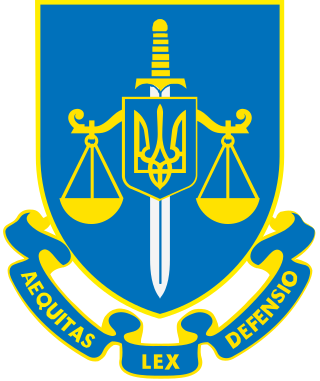Related Research Articles

Poltava is a city located on the Vorskla River in Central Ukraine. It serves as the administrative center of Poltava Oblast as well as Poltava Raion within the oblast. It also hosts the administration of Poltava urban hromada, one of the hromadas of Ukraine. Poltava has a population of 279,593.
The judicial system of Ukraine is outlined in the 1996 Constitution of Ukraine. Before this there was no notion of judicial review nor any Supreme court since 1991's Ukrainian independence when it started being slowly restructured.

The Constitutional Court of Ukraine is the sole body of constitutional jurisdiction in Ukraine. The Constitutional Court of Ukraine interprets the Constitution of Ukraine in terms of laws and other legal acts.

The Supreme Court of Ukraine is the highest judicial body in the system of courts of general jurisdiction in Ukraine.

The prosecutor general of Ukraine heads the system of official prosecution in courts known as the Office of the Prosecutor General. The prosecutor general is appointed and dismissed by the president with consent of the Verkhovna Rada. The prosecutor serves a term of office of six years and may be forced to resign by a vote of no confidence in parliament. The current prosecutor general, since 27 July 2022, is Andriy Kostin.

Mark Lawrence Wolf is a Senior Judge for the United States District Court for the District of Massachusetts and founder and chair of Integrity Initiatives International.
The High Council of Justice, or sometimes the Supreme Council of Justice is the national council of the judiciary of Ukraine, which submits motions to appoint, dismisses and disciplines judges. In 2021, the Ethics Council was created with the intention of selecting the members of the High Council of Justice in a way that would help to create an independent and efficient judiciary in Ukraine.

Corruption is an issue in Ukrainian society going back to the dissolution of the Soviet Union in 1991. After declaring independence from the Soviet Union, Ukraine faced a series of politicians from different sides of the political spectrum, as well as criminal bosses and oligarchs, who used the corruption of police, political parties, and industry to gain power. Despite improvements, as in Moldova corruption remains an obstacle to joining the EU.

National Anti-Corruption Bureau of Ukraine or NABU is a Ukrainian law enforcement anti-corruption agency which investigates corruption in Ukraine and prepares cases for prosecution. It has investigatory powers but cannot indict suspects. Only agency findings passed to the Specialized Anti-Corruption Prosecutor's Office become a part of criminal a case.
Sir Anthony Hooper, PC is a British judge (retired), former professor of law, and a member of Matrix Chambers. He joined Matrix Chambers in 2013 after his retirement from the Court of Appeal of England and Wales. In 2013 he was appointed inaugural Judicial Fellow of the Judicial Institute of University College, London, where he is an Honorary Professor. He is an Honorary Fellow at Trinity hall, Cambridge. Since 2018, he has been helping to fight corruption and to reform judicial system in Ukraine.

Oleksandr Oleksandrovich Danylyuk is a Ukrainian politician and military serviceman who served as the Secretary of the National Security and Defense Council (2019), the Minister of Finance of Ukraine (2016-2018). Danylyuk is a co-founder and the Head of the Center for National Resilience and Development.

The Specialized Anti-Corruption Prosecutor's Office is an independent structural unit of the General Prosecutor of Ukraine, and is primarily responsible for supporting and overseeing criminal investigations launched by the National Anti-Corruption Bureau of Ukraine (NABU).
As of July 2021, there is an ongoing constitutional crisis in Ukraine since 27 October 2020, when the Constitutional Court of Ukraine invalidated much of Ukraine's 2014 anti-corruption reform as unconstitutional.

The Ukrainian Ethics Council is a legal body of three Ukrainian and three international members created in 2021 to appoint members of the High Council of Justice. Anti-corruption organisations AutoMaidan, Dejure, and Anti-Corruption Action Center criticised the council's June 2022 appointments as including "tainted" judges and for refusing a well-known anti-corruption judge and whistleblower, Larysa Golnyk.
Oleksiy Yuriyovych Symonenko is a Ukrainian lawyer and former investigator.

Andriy Yevhenovych Kostin is a Ukrainian lawyer and politician. As of 2022, he is a People's Deputy of Ukraine since he was elected to it 2019. Kostin was a candidate in the 2021 competition to become the new head of the Ukrainian Specialized Anti-Corruption Prosecutor's Office (SAPO). Civil society organisations Transparency International Ukraine, Automaidan, Anti-Corruption Action Center and Dejure stated that Kostin did not satisfy the integrity criteria of the competition. Kostin was not selected. Kostin was the Head of the Verkhovna Rada Legal Policy Committee for two years, from 2020 to 2022. On 27 July 2022, Kostin was voted by the Verkhovna Rada as the Prosecutor General of Ukraine.
Dejure Foundation or Dejure, created in 2016, is a Ukrainian non-governmental organisation that promotes judicial reform in Ukraine. Dejure analyses judges' integrity based on their records and monitors legal developments related to the judiciary of Ukraine.
Dmytro Oleksandrovych Nalotov is a Ukrainian politician currently serving as a People's Deputy of Ukraine representing Ukraine's 144th electoral district from Servant of the People since 2019.

Oleh Yuriiovych Tatarov is a Ukrainian lawyer and administrator. He began working in the Ministry of Internal Affairs in 1999, later becoming its deputy head in 2011, before being dismissed from his post in 2014 following the Revolution of Dignity which he had worked to suppress under then Minister of the Interior Vitaliy Zakharchenko. In 2020, he made a return to politics after he was nominated Deputy Head of the Office of the President of Ukraine by Volodymyr Zelenskyy.
The Public Integrity Council is a Ukrainian advisory council created in 2016 for helping the High Qualifications Commission of Judges (HQCJ) of Ukraine to decide on the ethical eligibility of judges. In late 2023, a law giving the HQCJ the right to suspend members of the Public Integrity Council was launched in Verkhovna Rada, the Ukrainian parliament.
References
- 1 2 3 4 5 6 7 Sukhov, Oleg (2018-11-13). "Why Are Ukraine's Honest Judges Being Blocked from the Supreme Court and Anticorruption Court?". Atlantic Council . Archived from the original on 2022-06-16. Retrieved 2022-07-10.
- 1 2 3 4 Sukhov, Oleg (2022-07-08). "Oleg Sukhov: Ukrainian kleptocrats use war to entrench corruption, with Western experts as facade". Kyiv Independent . Archived from the original on 2022-07-09. Retrieved 2022-07-09.
- 1 2 Sukhov, Oleg (2022-06-24). "Watchdogs say Ukraine's judicial reform on brink of catastrophe". Kyiv Independent . Archived from the original on 2022-06-24. Retrieved 2022-07-09.
- 1 2 3 4 Golnyk, Larysa (2018-10-31). "A word to colleagues: on occasion of the 14th Congress of Judges" (PDF). Judges for judges . Archived (PDF) from the original on 2022-01-21. Retrieved 2022-07-10.
- ↑ "The key to judicial reform: what Venice Commission said about the reform of the High Council of Justice". Anti-corruption Action Center . 2021-05-21. Archived from the original on 2022-04-17. Retrieved 2022-07-10.
- ↑ "Ukraine". Solidarity Against Corruption . 2020. Archived from the original on 2021-07-27. Retrieved 2022-07-10.